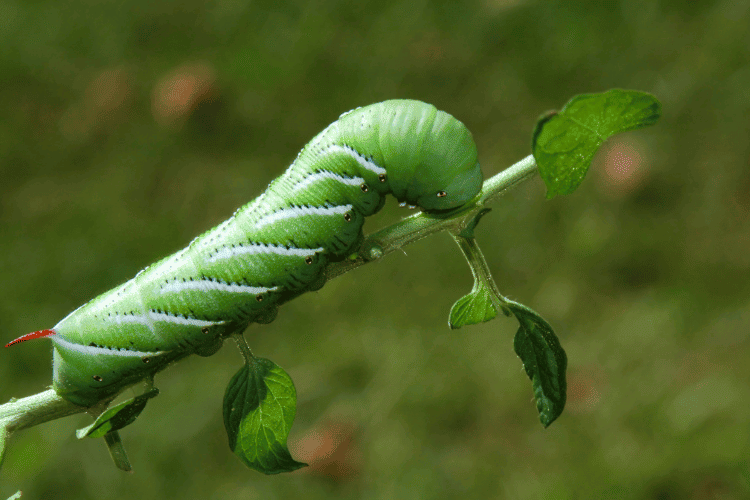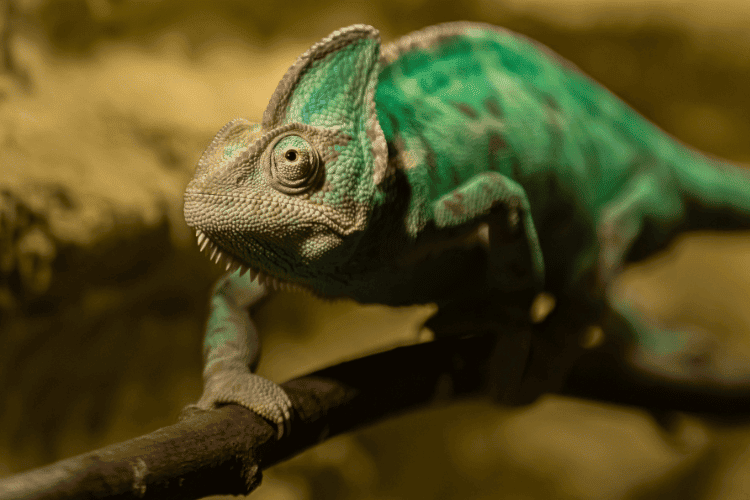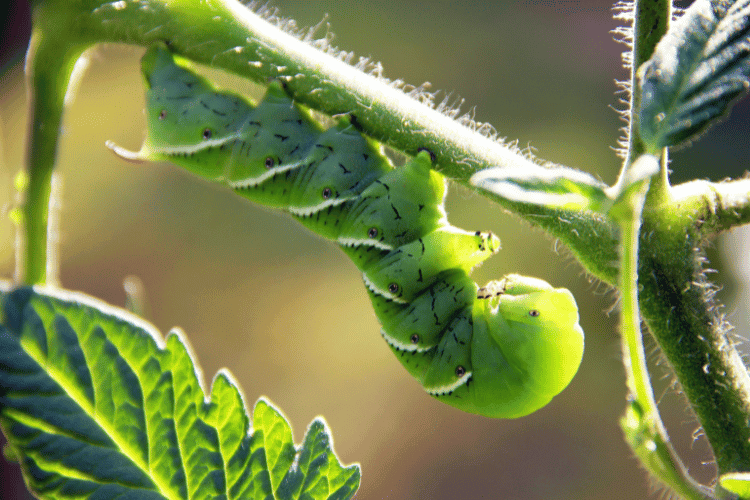Veiled chameleons can consume a variety of insects. They’re not particularly picky, which makes them gulp pretty much anything they can register as food. This makes it more likely for them to ingest something harmful than other pets.
Hornworms are among the most common feeding worms to reptiles, but are your veiled buddies on the guest list? Can veiled chameleons eat hornworms? The answer is a yes, with some precautions.
Will Veiled Chameleons Eat Hornworms?

Yes, veiled chameleons can indeed eat hornworms. However, it’s essential to keep in mind that hornworms should not constitute the entire diet of your pet chameleon. Instead, they should be offered as an occasional treat or supplement.
Hornworms have a high moisture content and are relatively low in protein. Consequently, overfeeding them can lead to nutritional deficiencies and potential health issues in chameleons.
Additionally, it’s crucial to select hornworms that are the appropriate size for your chameleon to avoid any choking hazards.
Can Baby Veiled Chameleons Eat Hornworms?
Certainly, baby veiled chameleons can eat hornworms, especially if you provide them with smaller hornworms. However, while they may consume them, it’s not advisable to do so.
Baby chameleons have specific nutritional needs, including a higher protein content, which is not typically found in hornworms.
For this reason, it’s generally not recommended to offer hornworms to your baby chameleons until they reach the juvenile stage, which typically occurs at around 6 months of age.
Now, here is the updated list of keywords with the used ones removed:
Pros of Feeding Hornworms to Your Chameleons
Here’s why it can be a good idea to use hornworms:
1. They’re a Good Source of Hydration
Hornworms are incredibly hydrating, as they are composed of approximately 85% water.
This high water content can be especially beneficial for chameleons, as they may not always drink from a water dish. Feeding them hornworms can help supplement their hydration needs, ensuring they stay properly hydrated.
2. They’re Easy to Eat
One notable advantage of hornworms is that they’re easy for chameleons to consume. This ease is primarily due to their soft exoskeleton, which makes them more palatable and digestible.
Chameleons can enjoy their meals without struggling with tough or hard-to-digest prey.
3. They’re an Excellent Source of Calcium
Hornworms are also a rich source of
Calcium is essential for chameleons, as it contributes to healthy bone development and overall well-being. Incorporating hornworms into their diet can help ensure they receive an adequate supply of this vital mineral.
Cons of Feeding Hornworms to Your Chameleons

Hornworms can still be a source of hard to your chameleons, here’s how:
1. They Can Bite
Hornworms have mandibles that are capable of biting. This biting behavior can be potentially harmful, both to adult and young chameleons.
The bites can cause stress or even physical harm to your chameleon. This is one of the reasons why it’s recommended not to offer hornworms to baby veiled chameleons or other smaller reptiles.
2. They Are Low in Protein
Hornworms are relatively low in protein, with a protein content of only about 9%. Chameleons have varying protein requirements depending on their species and whether they are primarily herbivores or carnivores.
Some chameleons may require protein levels ranging from 18% to 50% of their diet. Feeding them hornworms exclusively may not meet their protein needs adequately.
3. The High Water Content
While the high water content in hornworms can be an advantage for hydration, it’s a double-edged sword.
Excessive consumption of hornworms can lead to an overload of water intake, potentially causing diarrhea in chameleons. This can disrupt their digestive system and overall health.
4. They Can Be Toxic
Hornworms can be toxic to chameleons if they have been feeding on certain plants, such as tobacco or tomato plants. These toxic compounds from their diet can be passed on to the chameleon during consumption and may lead to adverse health effects.
It’s essential to source hornworms from a reputable supplier and ensure they have been fed a safe and appropriate diet.
Pro tip: The toxins that tomato hornworms and tobacco hornworms acquire from plants will change their normal blue body color into green. If you see a green hornworm, keep it away from your veiled chameleon.
How to Feed Hornworms to Your Veiled Chameleon
Here is a detailed guide on how to feed hornworms to your chameleon:
Step 1: Prepare the Hornworms
- Thoroughly wash the hornworms in cool water to remove any dirt or debris.
- Dust the hornworms with
calcium powder to help your chameleon meet itscalcium needs. - Place the hornworms in a feeding dish or container.
Step 2: Offer the Hornworms to Your Chameleon
- Place the feeding dish or container in your chameleon’s enclosure.
- Your chameleon will likely be attracted to the hornworms and will start to eat them.
Step 3: Monitor Your Chameleon While It Eats
- Hornworms can bite, so it is important to monitor your chameleon while it is eating to make sure that it does not get bitten.
- If your chameleon is having difficulty eating a hornworm, you can help it by cutting the hornworm into smaller pieces.
Step 4: Remove Any Uneaten Hornworms

- Remove any uneaten hornworms from your chameleon’s enclosure after a few hours.
- Uneaten hornworms can attract pests and bacteria, so it is important to remove them promptly.
How Small Should the Hornworms Be Before Feeding Them to My Chameleon?
The best hornworm size for chameleons depends on the size of the chameleon. Hornworms can grow quite large, so it is important to choose hornworms that are small enough for your chameleon to eat safely.
Here is a general guideline for hornworm size based on chameleon size:
- Baby chameleons: Avoid feeding hornworms to baby chameleons, as they can be a choking hazard.
- Juvenile chameleons: Juvenile chameleons can eat small hornworms, about 1/4-1/2 inch long.
- Adult chameleons: Adult chameleons can eat medium to large hornworms, about 1/2-1 inch long.
Conclusion: Should You Feed Hornworms to Your Veiled Chameleon?
Overall, the decision of whether or not to feed hornworms to your veiled chameleon is up to you. If you do choose to feed hornworms to your chameleon, be sure to do so in moderation and to choose hornworms that are the appropriate size for your chameleon.
It is also important to avoid feeding hornworms to baby chameleons, as they’re not nutritious enough and can be a choking hazard.


